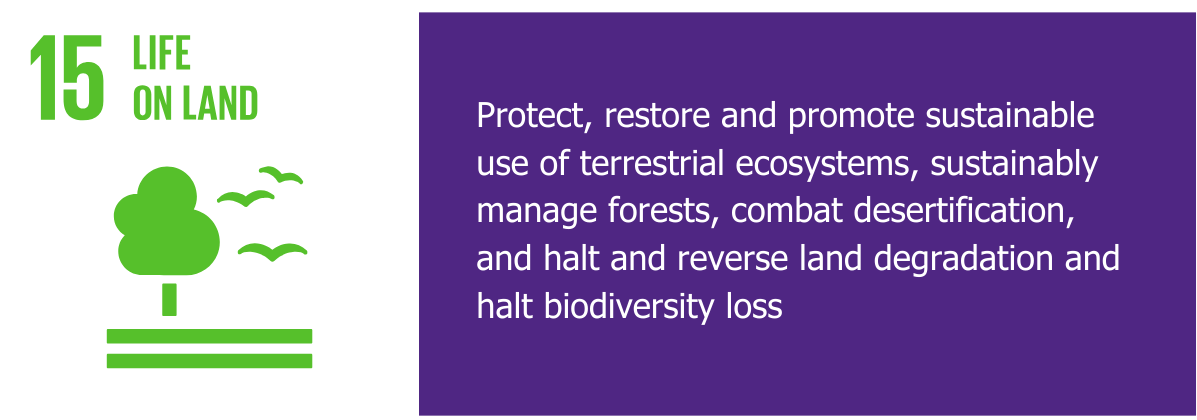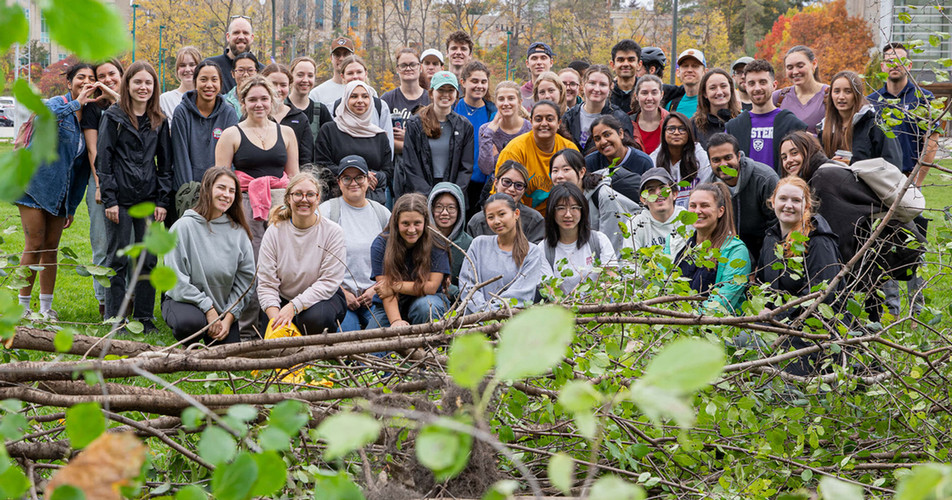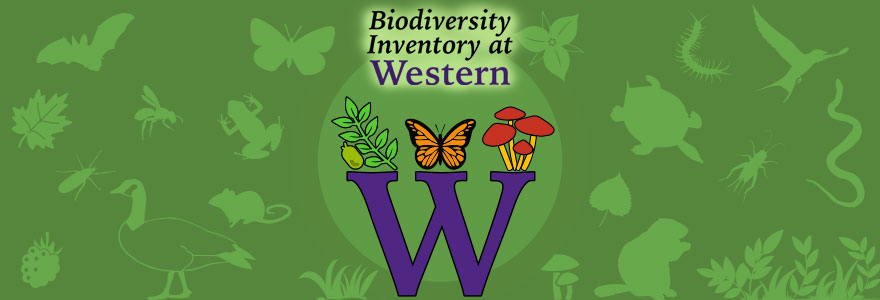SDG 15 - Strategic Initiatives
Maintain Biodiversity of Ecosystems
Western engages in research, industry, and local community collaboration to maintain and enhance ecosystems and biodiversity, including those under threat.
- Advanced Facility for Avian Research (AFAR): AFAR is a world-class facility for interdisciplinary studies of bird physiology, neurobiology, and behaviour. Conservation and population biology depend critically on birds as biomarkers and birds' global movements have important implications for human and ecosystem health. AFAR features the world’s first hypobaric climatic wind tunnel for bird flight.
- Hypobaric Climatic Avian Wind Tunnel: Allows researchers to study birds in flight and how they are affected by climate conditions. It can be used to help support migratory stop-over habitats to maintain our bird ecosystems.
- Campus as a Living Lab: This project unites faculty, staff, community, and industry partners to protect the biodiversity on our campus. Projects include:
- The Bee Yard: Studies honeybee dance communication.
- The Biophysics of Communication: Studies acoustic and vibratory communication in insects and spiders.
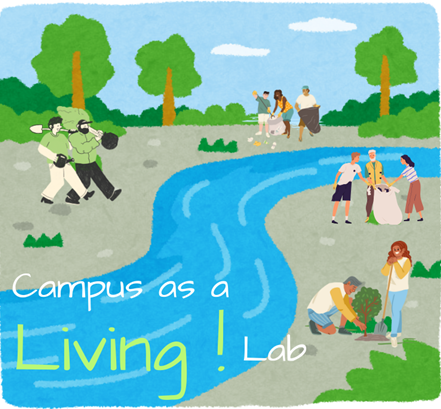
- Barn Swallow Breeding and Nesting Structure: Provides suitable nest structures to support this species at risk.
- Hoverflies Project: Researches the migratory behaviour of North American hoverflies, important pollinators across all ecosystems in North America.
- Environmental impacts of road salt: Industry and research collaboration, studying the environmental effects of de-icing salts.
- Invasive Species Management: Management of buckthorn on campus, an invasive species that poses severe threats to local ecosystems.
- Centre for Animals on the Move (CAM): CAM conducts cutting-edge research on how animal movement is shaped by environmental and human factors, with a focus on conserving migratory and non-migratory species across Canada. Through initiatives like the Motus Wildlife Tracking System and isotopic analysis, CAM enables long-term monitoring and protection of biodiversity in ecosystems under threat. CAM regularly hosts events to workshop ideas, brainstorm interdisciplinary collaborations, and learn new skills.
- iNaturalist Canada - Western Chapter: Led by the Canadian Wildlife Federation, the Royal Ontario Museum, Parks Canada, and NatureServe Canada, it focuses on identifying species on campus, particularly those at risk. The Thames River, running through campus, is home to various animals such as waterfowl, beavers, and the spiny softshell turtle, a species at risk.
- Motus Wildlife Tracking System: A Western project will expand national wildlife tracking as animals shift their habitats into Canada from the south. By enhancing coverage and integrating environmental sensors, the project enables researchers to maintain and extend biodiversity in ecosystems under threat from climate change and urbanization.
- Newport Forest: A closed conservation area and the site of long-term biodiversity monitoring, with over 3,000 species recorded. Western-affiliated researchers contribute to maintaining and expanding the biodiversity of this recovering Carolinian forest ecosystem.
- Sherwood Fox Arboretum: A collection of trees on campus, which represents the biodiversity of the Carolinian Zone, including an old growth forest.
- International Agenda for Botanic Gardens in Conservation: Signed by Western in 2003, it prioritizes plant conservation.
- Western University Tree Dashboard: Offers an interactive tour of the arboretum.
- A Tour of Select Trees in the Sherwood Fox Arboretum: Tells the story of the biological and historical importance of the trees.
- WesternWater Centre (WWC): WWC collaborates with the government, local municipalities, industrial partners, academic partners, and the local Indigenous community. The centre focuses on research leading to innovative solutions addressing all aspects related to clean water supply and water-environment issues, including the protection and management of water resources, resource recovery, and treatment technologies, to aid our aquatic ecosystems.
Ecosystem Education

Western offers free and paid educational programs on ecosystems, including about flora and fauna, for local and national communities.
- Advanced Facility for Avian Research: AFAR is accessible to non-academic users and supports research into how birds adapt their reproductive and migratory strategies to environmental pressures, offering valuable insights into avian ecology and conservation.
- Annual CanFunNet Fungal Biology Conference: This national conference brings together researchers and community members to share knowledge about fungal biology, promoting awareness of fungi’s ecological roles and their importance in maintaining biodiversity across Canadian ecosystems.
- Connecting for Climate Change Action: Offered by the Department of Geography and Environment, this free course educates participants on climate change’s impact on ecosystems and empowers them to take informed action through community engagement and environmental stewardship.
- Department of Biology: The department hosts public talks, high school visits, and group tours focused on conservation biology, climate change, and ecosystem health, fostering ecological literacy and inspiring future scientists and conservation advocates.
- Laurie L. Consaul Herbarium: With over 42,000 plant specimens from southwestern Ontario, the herbarium collaborates with Carolinian Canada to produce outreach materials that educate the public on species and habitats at risk in the Carolinian Zone.
- Free Weekly Biology Seminars: These seminars cover topics such as bird conservation, biodiversity in agroecosystems, and pollination ecology. They are open to the public and provide accessible, research-based education on ecosystem dynamics and conservation strategies.
- Ivey Conservation Leadership Program: This program trains mid- to senior-level conservation professionals through immersive workshops, case studies, and collaborative learning. It equips participants with strategic tools to lead biodiversity initiatives and strengthen land conservation efforts across Canada.
- Ivey’s Future of Agri-food: This public-facing event series explores the ecosystem of agriculture and food in Canada, addressing sustainability, biodiversity, and climate resilience. Episodes are freely available online, making expert insights accessible to a broad audience.
Master of Environment and Sustainability: This graduate program integrates sustainability education with the SDGs, emphasizing ecosystem health and preparing students to lead environmental initiatives in diverse sectors. - Our Warming Planet: This public-facing Western News series explores climate change impacts through expert interviews and storytelling, highlighting civic action, sustainable living, and cross-sectoral solutions to help readers understand and respond to ecological challenges.
Local Biodiversity in Planning
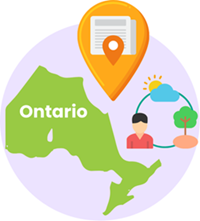
Western takes into account local biodiversity in the planning and development process.
Sustainable Design Guidelines provide frameworks so that projects are designed, constructed, and operated to have a minimal impact on the natural campus ecology.
Western's Open Space Strategy emphasizes preserving biodiversity by enhancing and maintaining natural areas on campus. Reclaiming asphalt to create more greenspace, planting trees, removing invasive species, and protecting the tree canopy are all prioritized.
Building sites go through the Ontario Environment Assessment Process, including a review by the Ministry of the Environment, Conservation and Parks, to assess biodiversity concerns.
Water Discharge Guidelines 
Western University has comprehensive policies and procedures to prevent polluted water from entering natural systems, including in response to accidents and incidents. These align with federal, provincial, and municipal regulations such as the Canadian Environmental Protection Act, the Ontario Water Resources Act, and the City of London’s Water By-law (W-8) and Waste Discharge By-law (WM-16). These regulations prohibit the discharge of pollutants into bodies of water and ensure high water quality.
Western’s Policy on Environment and Sustainability promotes sustainability and waste reduction. Procedures include handling and disposing of contaminated biowaste, emergency response plans, and regular safety audits. Key policies include:
- Contaminated Biological Waste Disposal Policy
- Hazardous Chemical Waste Policy
- Hazardous Waste
- Laboratory Health and Safety Manual
Western also has a plan to minimize alterations to local ecosystems and implements practices to protect these ecosystems, such as:
- Campus Master Plan: Restricts development on floodplain regions in accordance with the Upper Thames River Conservation Authority regulations.
- Ontario Environment Assessment Process: Requires that new build sites are reviewed by the Ministry of the Environment, Conservation and Parks and denied if there are environmental concerns.
- Western Open Space Strategy: Restricts development in the forested areas along the Thames River and Medway Creek to preserve biodiversity.
- Waste Streams @ Western: Works to divert waste from landfills.
Sustainable Use of Land
Western supports and organizes events aimed at promoting the conservation and sustainable utilization of land, including forests.

- Advancing Regenerative Agriculture in Canada: This report emphasizes the principles of regenerative agriculture to improve impacts on soil health, biodiversity, and water outcomes. It encourages farming that minimizes soil disturbance, protects soil surfaces, maintains living roots, ensures crop diversity, and integrates livestock.
- Community Field Course in Land Healing and Responsibility: This community-based experiential course combines in-class discussions with community-based research. Students train in methodologies and ethics of working with Indigenous communities. Areas of research include ecological restoration, land claims, and urban issues.
- Conservation Impact Bond—Brief for Policymakers: Financial participants provide an immediate pool of funds to accelerate a Healthy Landscape Portfolio of “on-the-ground” habitat projects delivered by diverse and experienced groups and landowners. These projects could include protecting biodiversity; planting trees; restoring waterways; removing invasive species; growing native plants; installing seed orchards; connecting natural infrastructure; and implementing nature-smart climate solutions, urban forestry, or regenerative agriculture.
- Curatorial Tour and Talk: This project developed a hands-on workshop focused on ethical mining operations.
- Deshkan Ziibi Conservation Impact Bond: A place-based collaboration and financial instrument to accelerate healthy landscapes in the spirit and practice of reconciliation. It aims to protect the values of nature for monetary, sociocultural, and ecological returns in the Carolinian Zone.
- Earth Observation of Vegetation: This Western Space event convened experts from academia, industry, and community organizations to discuss sustainable land use and vegetation monitoring across Canada. Through interdisciplinary panels and collaborative breakout sessions, the event promoted conservation strategies and generated over 50 research ideas focused on biodiversity, forestry, agriculture, and ecosystem resilience.
- Ecologies in Practice: The podcast and workshop series focuses on the environment and explores environmental issues and climate change from an artistic perspective.
- EnviroCon: An interdisciplinary conference organized every year for students, faculty, and community members involved in environment and sustainability. Topics have included Acclimation Capacity of Photosynthesis and Respiration to Temperature in Dominant Mature Boreal Conifer Tree Species.
- Forest City Tree Festival: Supported by the Western Sustainable Impact Fund and run in collaboration with the City of London, ReForest London and the Upper Thames River Conservation Authority, the community festival is “all about celebrating the important role trees and forests play in our lives”. Activities include guided hikes, panel discussions, tree planting, and a native plant and seed exchange.
- Ivey Conservation Leadership Program: This structured program equips participants to support land conservation, as well as navigate environmental challenges. It is grounded in best practices to shape Canada’s conservation landscape.
- Newport Forest: This 46-hectare conservation area is an intact forest landscape which is not open to the public, and all trespassing, including hunting, fishing, and walking are forbidden. The dream is to create a National Forest, with these tracts as nuclei for a massive reforestation project. Researchers perform ecological monitoring and biological inventorying, which found more than 1,700 species so far. Contact the Thames Talbot Land Trust to arrange for a guided tour.
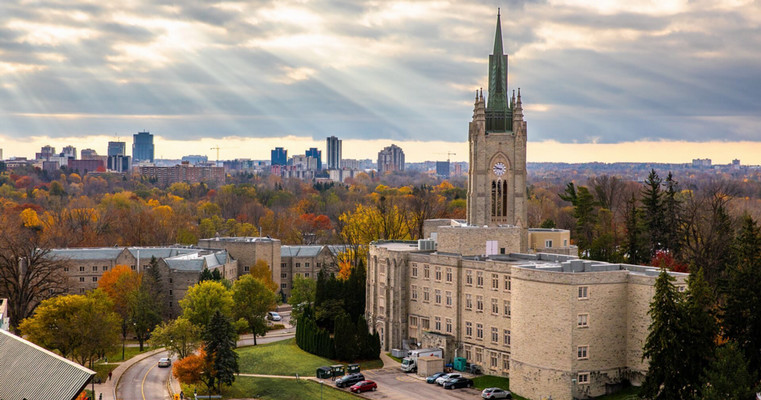
Sustainable Food
Western’s Hospitality Services have a public commitment to sustainably farmed food in their Sustainability Commitment Report. They prioritize purchases of products from local, sustainable sources.
- Buying Local: How do we define local? Anything produced, raised, or processed in Ontario!
- Fair Trade: Hospitality Services went Fair Trade in 2015! We offer coffee, tea, and chocolate bars.
- Honeybees: Great Hall Catering maintains honeybee hives on campus, from which honey is used in various recipes, made available for tea and coffee, and bottled for sale.
- MealCare: Western partners with the NGO MealCare to rescue surplus food and redistribute it to feed those in need in our community.
- Meatless and Vegan: Residence dining serves 48% of their menu options as meatless, and half are completely vegan.
- Nutrislice: This interactive portal allows students to explore the emissions grade of their meal choices.
- Nutrition Support: A registered dietician is available to support food allergies and special diets like halal, vegan, and gluten-free.
- Sustainable Seafood: High Liner Foods, the main seafood supplier for Residence Dining, has pledged to source responsibly, with 99% of their supply certified as sustainable or responsible, and Bento Sushi is MSC-certified.

Sustainable Agriculture
Western’s Ivey Business School offers free and paid educational programs for local and national communities on sustainable management of land for agriculture.
- Advancing Regenerative Agriculture in Canada: This free, online flipbook is a detailed, evidence-based account of today’s Canadian agriculture system so anyone interested in sustainable farming can understand the industry. A diverse set of perspectives is needed to succeed in achieving a just transition to regenerative agriculture.
- Agri-Food System: Located at Ivey’s Centre for Building Sustainable Value (BSV), research is conducted on Canada’s agri-food system and its linkages with sustainability challenges. The system spans supply chains and involves farmers, processors, distributors, retailers, and consumers that operate at local, provincial, national, and even international levels. BSV seeks to shape the path towards an ecologically sound, fair future.
- Bio-Economy is the Future We See: Ivey’s inaugural Idea Forum explored how innovative business models and financial tools can address biodiversity loss. The event emphasized the role of sustainable land use in aligning environmental goals with corporate performance.
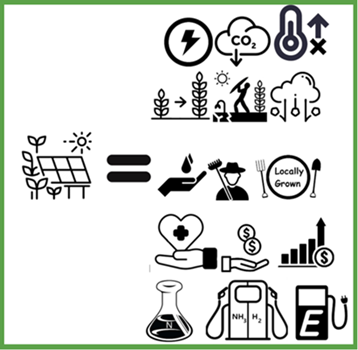
- Canadian Circular Economy Summit: This summit engages thought leaders from the private sector, public sector, and academia to drive projects, investments, and policies that advance circularity in support of Canada’s climate, biodiversity, and innovation goals. By presenting how circular solutions for upcycling food waste can significantly cut emissions, it highlights the role of sustainability in shaping a low-carbon future.
- CarbFarm Pilot Study: Founded by Western Ivey students, CarbFarm helps Ontario grain farmers adopt regenerative practices like cover cropping and no-till farming. Through free soil testing and consultation, the pilot supports sustainable land management and future access to carbon credit markets.
- Colloquium on Collective Action for Resilient, Just Agriculture: The event convened partners from farming communities, farmer associations, government, industry, municipalities, non-profits, Indigenous communities, and academia to explore how agricultural systems can operate more sustainably while making food accessible and affordable for Canadians.
- Entrepreneurship and Sustainability Accelerator (“Regenerator”) Initiative: Through a 16-week intensive paid program, selected ventures receive hands-on mentorship and educational training from in-house experts and industrial partners.
- Future of Agri-food Event Series: These free sessions engage executive leaders in business and finance to raise awareness about sustainability challenges in Canada’s agri-food sector. The series emphasizes the importance of a just climate transition in agricultural transformation.
- System Transformation Pathways Initiative: Key Canadian agri-food system stakeholders are engaged to characterize a shared vision of the future agri-food system and then clarify critical pathways (e.g., technology, sourcing, and production paradigms; financial models) and actions that can accelerate the transformation towards this ideal future.
Sustainable Tourism
Western offers education and outreach about sustainable management of land for tourism.
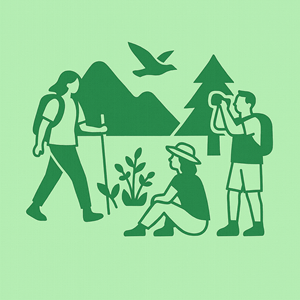
- Anthropology of Tourism Course: Critically examines tourism, particularly its effects on both hosts and guests. Topics will include tourism and culture; the political and economic issues connected with tourism; tourism and the environment, with special attention to ecotourism; and conflict over resources.
- Environmental Anthropology in Madagascar: Western’s field course in Madagascar teaches students and local partners about sustainable land use through ecotourism. By camping in biodiverse regions and collaborating with community-led conservation projects, students gain hands-on experience in responsible tourism and environmental protection. The program fosters cross-cultural learning and supports local efforts to preserve ecosystems while improving livelihoods.
- Geography of Tourism Course: Examines tourism as a global, national, and local phenomenon, with economic, social, and environmental impacts. Topics include tourism theory, major tourist destinations, climate change impacts, media influences, hosts, guests, and local tourism.
- Graduate Diploma in Climate Risk Assessment and Opportunity: This program promotes a proactive approach to climate change and prepares graduates for a career as an environmental risk assessor, an eco-tourist researcher, an urban planner, and more.
- Land Use Planning Course: Establishes the foundations of planning, why it is important, and the impact that it has on the physical forms of our cities and communities and how we use them, including culture and heritage planning, planning ethics, politics of planning, and planning to address climate change.
- (Re)Theorising Touristic Governance in the Shadow of Empire: Hosted by King’s University College, this international workshop examined tourism as a political force, exploring its governance and implications for land use, cultural heritage, and community agency.
- Western Alumni Travel: Western Advancement facilitates travel experiences for alumni, through a carefully selected agency that prioritizes sustainability. This agency collaborates with like-minded partners who share our commitment to respecting and preserving the planet’s resources.
Conservation of Ecosystems
The preservation, restoration, and protection of Western’s natural environment and ecosystems, which includes forests, is paramount to maintaining the outdoor character and sense of place of the campus.
- Buckthorn Bust – Invasive Species Removal: As part of the Campus as a Living Lab initiative, MES students collaborated with Western’s Landscape Services to remove invasive buckthorn shrubs along the Thames River. Using ecological sampling and spatial analysis, they prioritized high-density areas for removal, contributing to forest restoration and biodiversity protection.
- Campus Naturalization and Water Quality Protection: As part of the Campus as a Living Lab initiative, Western students, faculty, and community members planted native shrubs and trees along Medway Creek to stabilize banks and improve water quality. Supported by the Upper Thames River Conservation Authority, Indigenous partners, and a Thinking Globally, Acting Locally grant, this project exemplifies ecological restoration and collaborative stewardship.
- Forest City Tree Festival: Hosted by Western and supported by the Sustainable Impact Fund, this multi-day event featured guided hikes, tree planting, and expert panels. It promoted forest conservation, urban canopy health, and community engagement in ecological restoration, including walks through the Medway Valley Heritage Forest.
- Ivey Centre for Building Sustainable Value Mission & Strategy Overview: This strategy document elaborates on the mission to shape pathways of systems change towards an ecologically sound, fair future:
- With 6.5% of Canada’s land utilized for crops and grazing, agriculture is a major force of biodiversity decline across all classifications of organisms. As we tackle inequalities, we also must work towards the development of agri-food systems that are harmonious with nature.
- Research focuses on frontier applications of sustainable finance in Canada—including ecosystem conservation, blended finance, and Indigenous communities.
- Newport Forest: The Thames Talbot Land Trust manages Newport Forest under a conservation policy that aligns with sustainable land use and restoration goals. Western researchers contribute data that informs these conservation strategies.
- Sherwood Fox Arboretum: Encompassing all planted trees and shrubs on campus, the arboretum showcases the biodiversity of the Carolinian Zone and other temperate species. It supports conservation, public education, and research, with labeled trees and interactive tools like the Western Tree Dashboard.
- Sustainable Design Guidelines: Establishes campus-wide performance criteria for buildings and sites, strengthens best practices of sustainable design, and encourages advanced building performance over time:
- Projects should be designed, constructed, and operated to have a minimal impact on the natural campus ecology.
- Projects are LEED certified. LEED incorporate principles such as, site selection to minimize environmental impact, protecting habitats, native plantings, creating of greenspace, sustainable water resource management, use of sustainable building materials, and ecological restoration.
- Western’s Open Space Strategy: In section 6.6 Woodlots, Management of Natural Areas, and Campus Ecology Strategy, guidelines for campus development include:
- Preservation of existing woodlots as a priority;
- Increasing canopy coverage by planting trees, or enhancing existing areas with succession plantings;
- Landscape planting should complement the natural environment and contribute positively to natural processes;
- Extending woodlot coverage through new tree massings, transitioning maintained sod areas into naturalized meadow areas;
- Woodlots and natural areas along river corridors should be reviewed to identify and remove any potential invasive species that may harm local plant communities;
- Trees should be preserved where possible; and
- Where distinctive trees must be removed for future development, site planting designs should look to replace (at a minimum) or exceed the number of trees removed.
- Wildfire Resilience Consortium of Canada: Launched by the Government of Canada, Western is a foundational member of this national initiative focused on addressing the challenge of wildfires. It brings together researchers, Indigenous leaders, and policymakers to accelerate innovation in wildfire management, promote adaptive forest practices, and mobilize place-based knowledge, strengthening early warning systems and community resilience to extreme wildfires across Canada.
Species Conservation
Western identifies, monitors, and protects endangered and threatened species within university areas, in line with national guidelines and policies that inform its species-at-risk protection initiatives, as shown below.
- Biodiversity Inventory: We are conducting a Biodiversity Inventory on our main campus to identify and monitor environmentally significant features for long-term ecological assessment. Participants are trained to follow guidelines for recording sensitive species, including Species at Risk, to minimize harm and ensure compliance with conservation protocols. As of 2023, observers had found 22 at-risk species through this project.
- Dr. Laurie L. Consaul Herbarium: Located centrally in the Carolinian zone, the herbarium partners with Carolinian Canada to produce educational and outreach material on species and habitats at risk in the Carolinian Zone.
- Environmental Assessments: Before any habitats are disturbed, a thorough environmental assessment is conducted, per Ontario law, to identify and monitor species at risk and their critical habitats.
- Habitat Stewardship Program: Western University adheres to the federal Species at Risk Act by protecting critical habitats and ensuring that our operations do not harm these areas. We encourage students to contribute to species recovery efforts by supporting them in applying for Habitat Stewardship Program grants.
- Master of Environment and Sustainability: This master’s program builds professional skills to prefare graduates to address some of today’s most pressing environmental and sustainability challenges such as climate change, waste reduction, and conservation. Andie Albert is using her degree to become her community’s species-at-risk specialist in the Chippewas of the Thames First Nation.
- Nutrient Movement and Modelling Lab: Models, laboratory studies, and field experiments are used to understand the cycling of carbon and nitrogen in forests and fields. The goal is to use these models to understand global change and develop models to predict the distribution of animals. Understanding their impacts will aid conservation efforts when they are at risk.
- Species at Risk Act (SARA): The government of Canada passed SARA to prevent wildlife species in Canada from becoming extinct, endangered, or threatened. Environment and Natural Resources is responsible for listing species in Canada and uses the International Union for Conservation of Nature Red List as a resource.
- Species-at-Risk Leadership – Andie Albert: A graduate of Western’s MES program, Andie Albert now leads species-at-risk efforts in the Chippewas of the Thames First Nation. Her work integrates Indigenous knowledge and Western science to protect endangered spiny softshell turtles and educate others on conservation through a two-eyed seeing approach.
- Ukpik-1 Satellite Launch: Developed by Western and Nunavut Arctic College, Ukpik-1 is a CubeSat that supports immersive Earth observation and student training in space mission development. It integrates Indigenous collaboration and lays the groundwork for tracking species at risk from orbit.
- Western Centre for Animals on the Move (CAM): This centre conducts research on how, why, and where animals move. Designing effective conservation actions for migratory and non-migratory species in Canada is a major conservation challenge. CAM informs the way we measure, approach, communicate, and ultimately interact with mobile animal species.
- Western Skylark: Next generation tracking of migratory wildlife, including songbirds, waterbirds, and shorebirds, contributes to a better understanding of animal movements and supports conservation efforts.
Invasive Species
Western’s policy on reducing invasive species (alien species) on campus can be found in:
- Western’s Open Space Strategy: Guidelines for campus development include:
- Natural Woodlots: Removal of any invasive species and continued monitoring;
- Thames River: Removal of invasive species to open sightlines to the river;
- Medway Creek: Remove invasive species along the existing footpaths which fall on Western University property;
- Woodlots, Management of Natural Areas, and Campus Ecology Strategy: Woodlots and natural areas along river corridors should be reviewed to identify and remove any potential invasive species that may harm local plant communities; and
- Planting Design Guidelines: Use of invasive plant species will be avoided. In locations where existing invasive species have established, specifically those located in the natural areas of the campus, these plants should be removed.
- Campus as a Living Lab: Projects create cohesion between academic and operational aspects of the university, leading to a more integrated campus environment.
- Buckthorn Bust: A systemic initiative to document buckthorn’s spread around campus, placing special emphasis on areas where this invasive species is predominant, to ensure prompt action. It is an invaluable hands-on experience for Master of Environment and Sustainability students, tasking them with data collection, species identification, and the physical removal of buckthorn in the area.
Local Ecosystem Collaboration
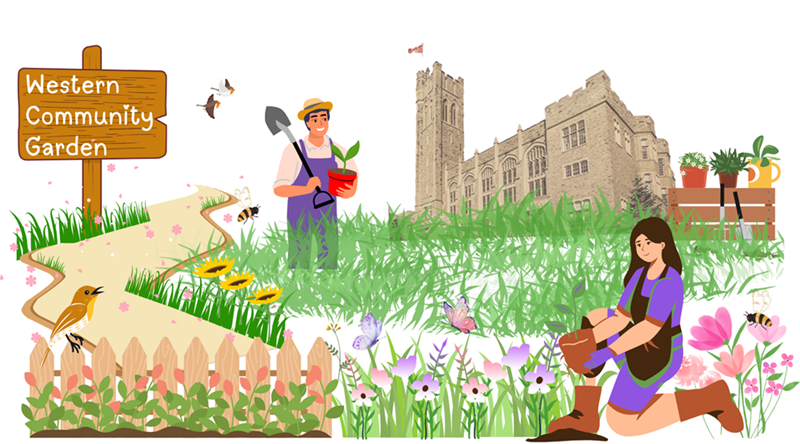
Western collaborates with the local community to maintain shared land ecosystems.
- Campus as a Living Lab: This initiative brings together collaborations of faculty, staff, students, community, and industry partners. Projects and events support biodiversity, conservation, visual arts, land restoration, improved energy systems, and more.
- Community Garden: This is a place to ease anxiety over climate change, build knowledge and community, and get healthier. A new handbook—a simple guide to educate newcomers to the community garden, including checklists and planting tips—conveys garden history, the benefits of gardening, and other important information.
- Connecting for Climate Change Action: A free, publicly available award-winning course braids together Eurowestern science and Indigenous Knowledges and perspectives, educates on climate change, and inspires learners to use that knowledge to take action in their local ecosystem.
- Earth Observations of Vegetation: The event united researchers, government, industry, and community partners to advance vegetation monitoring and land stewardship. This collaboration supports shared ecosystem management and reflects Western’s commitment to sustainable land use through cross-sector partnerships.
- Environmental Sciences Western Field Station: Western collaborates with government agencies and research institutes to manage and restore shared ecosystems. Its ecological restoration projects, agricultural trials, and biodiversity monitoring contribute to regional conservation efforts and sustainable land stewardship.
- Forest City Tree Festival: Supported by the Western Sustainable Impact Fund and run in collaboration with the City of London, ReForest London, and the Upper Thames River Conservation Authority, the community festival is “all about celebrating the important role trees and forests play in our lives”. Activities include guided hikes, panel discussions, tree planting, and a native plant and seed exchange.
- Medway Creek Photo Stations: Western’s Medway Creek photo monitoring project engages the public in ecological restoration through community-submitted timelapse images. Volunteers and students help stabilize the creek bank, promoting biodiversity and flood resilience while fostering shared stewardship of local ecosystems.
- Nature-Based Solutions: Ivey Business School professors argue that: Any measure of biodiversity must be sensitive to local ecosystems and local communities. It needs to build on local knowledge, especially from people who live on the land in question, such as Indigenous Peoples. They engage local feedback into their research at the Centre for Building Sustainable Value.
- Newport Forest: Western collaborates with local conservation groups, supporting the shared stewardship of this significant land ecosystem, making it one of the most intensively sampled sites in the world.
- Salthaven Wildlife Rehabilitation Centre: Western engineering students partnered with Salthaven to design custom splints for injured waterfowl, supporting wildlife recovery and conservation. This collaboration enhances shared ecosystem stewardship and reflects Western’s commitment to community-based environmental impact.
- Western Research Parks Innovation: Academia meets industry in state-of-the-art spaces, including offices, wet labs, and industrial collaborative spaces, set in inspiring buildings and open parklands. Founded and led by Western graduates, PolyAnalytik is one of 53 businesses at Western Research Parks. It analyzes and improves products and technologies used in medical devices, pharmaceuticals, as well as in agriculture.
- Western Riverfest: Deshkan Ziibi (Thames River) connects Western University with the broader London community. The annual Riverfest celebration provides unique opportunities for students, staff, faculty, and community members to learn, enjoy, and honour the river.
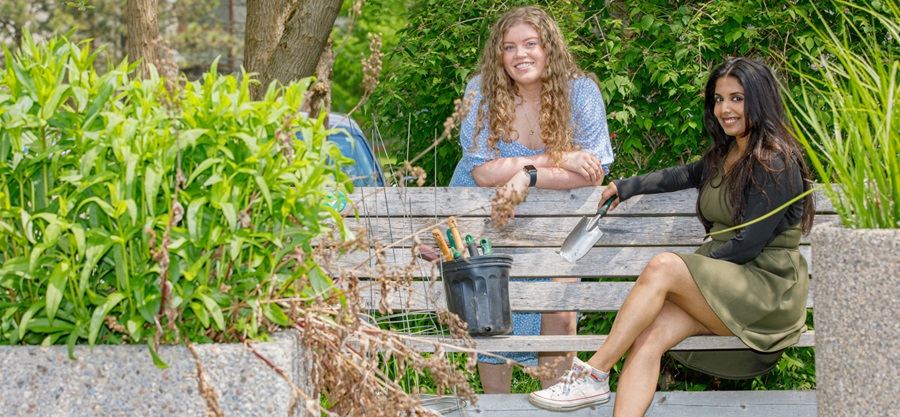 Olivia D'Andrea Brooks and Rubiga Thanganathan (L to R) studied Western's community garden in a year-long research project, part of the university's Campus as a Living Lab program. (Christopher Kindratsky/Western Communications)
Olivia D'Andrea Brooks and Rubiga Thanganathan (L to R) studied Western's community garden in a year-long research project, part of the university's Campus as a Living Lab program. (Christopher Kindratsky/Western Communications)
Plastic Waste Reduction
Western is committed to reducing plastic waste on campus through operational changes, student-led initiatives, and cutting-edge research.
- Compostable and recyclable containers: Hospitality Services have replaced conventional single-use plastic containers throughout campus operations.
- Eliminating Plastic Bottled Water: Western stopped selling plastic bottled water on campus at any university functions, vending machines, or by any on-campus restaurants or vendors. Free, accessible water is available across campus at more than 200 refill stations.
- Snack Wrapper Recycling: A student initiative has placed snack wrapper recycling boxes in many buildings across campus, focusing on high-traffic areas where people often eat.
- Straws, Stir Sticks, Bags, and Cutlery: We have replaced plastic straws with paper ones, plastic stir sticks with wooden options, and plastic bags with paper alternatives. Compostable cutlery and to-go dishware are available in all residence dining halls and at our catering events, and all disposable hot beverage containers are routed to the “organics” stream.
- Streamlining Surgical Trays: Dr. Strychowsky won a Western Green Award for changing processes at Western's affiliated hospitals to reduce impact and waste. She also implemented a reusable patient belonging bag program, replacing single-use plastic bags with a more environmentally friendly option.
- What Goes Where at Western: Western has multiple waste streams to divert as much as possible from landfills to recycling, re-use, and organics.
In addition, Western is producing innovative research on converting plastics to other usable materials:
- Biodegradable Bioplastics: Rebecca Koshy, a fourth-year chemical and biochemical engineering student has pioneered an innovative solution to the plastic pollution problem by developing biodegradable bioplastics.
- Eating Asteroids: A groundbreaking project has developed an open-source bioreactor that can convert carbon from plastic into edible protein, offering a potential solution for plastic waste management.
- Fallona Family Interdisciplinary Science Award: Award winner Patricia Corcoran is a leading expert on microplastics pollution research, influencing disparate worlds of science and art with her discovery and depictions of human-caused pollution.
- Hemp-based Biomaterial: Elizabeth Gillies has worked to develop a new biodegradable, hemp-based material that could serve as a sustainable substitute for plastic packaging needs for a wide variety of products.
- Solar-Powered Charging Station Picnic Tables: The Western Sustainable Impact Fund is supporting a project to create picnic tables made from waste plastic composites with a solar panel tabletop to charge devices.
- SpecOptiBlend: An open-source software that enables custom-colored 3D printing using recycled plastics, helping reduce plastic waste through creative reuse.
- Tackling Plastic Waste: Next Generation Manufacturing (NGen) partnered with Ivey’s Innovation North to find solutions to plastic waste. NGen uses the information gleaned from the project to identify opportunities to secure supply chains, protect the environment, improve healthcare, support technology adoption, and facilitate digital transformations across Canada’s manufacturing sector.
- Upcycling PET into Food: Professor Joshua Pearce conducts research on ways to harvest edible microbial protein powder from plastic-eating microorganisms to make food.
Hazardous Waste Disposal
Western University has policies on hazardous waste disposal that include:
- Policy 1.31 – Hazardous Chemical Waste: Ensures the safe and proper handling and disposal of harmful chemicals.
- Policy 1.48 – Environment and Sustainability: Encourages recycling, reuse, and life cycle management of resources.
- Hazardous Materials and Waste Management Handbook: Addresses the most common types of hazardous waste generated on campus with detailed instructions on proper waste disposal.
- Hazardous Materials Waste Pick-up: Scheduled weekly by technical and environmental specialists from RPR Environmental.
Western adheres to federal, provincial, and municipal regulations, including the Canadian Environmental Protection Act and Waste-Free Ontario Act. Waste is managed locally, and multiple waste streams—including e-waste, batteries, and pharmaceuticals—are tracked through the Waste & Recycling Portal. Signage and education across campus reinforce responsible disposal.
